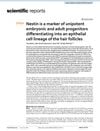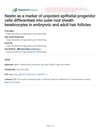 2 citations,
September 2007
2 citations,
September 2007 Surgical hair restoration involves moving hair from a non-balding area to a balding area, with the transplanted hair not subject to male pattern baldness. Medications can slow hair loss and regrow some hair, but successful treatment needs careful planning, skill, and ethical responsibility due to progressive hair loss and limited donor hair.
 1 citations,
October 2022 in “Scientific reports”
1 citations,
October 2022 in “Scientific reports” Nestin identifies specific progenitor cells in hair follicles that can become outer root sheath cells.
1 citations,
January 2021 in “Journal of V. N. Karazin Kharkiv National University: Series Medicine” Nonandrogenic factors like oxidative stress and microinflammation are important in hair loss progression.
 1 citations,
July 2020 in “bioRxiv (Cold Spring Harbor Laboratory)”
1 citations,
July 2020 in “bioRxiv (Cold Spring Harbor Laboratory)” Removing centrosomes from skin cells leads to thinner skin and stops hair growth, but does not greatly affect skin cell differentiation.
 1 citations,
January 2017 in “Springer eBooks”
1 citations,
January 2017 in “Springer eBooks” The document explains how hair loss patterns in men and women, known as Androgenetic alopecia, are classified using the Hamilton-Norwood system for men and the Ludwig grade system for women.
 1 citations,
January 2014 in “Hair therapy & transplantation”
1 citations,
January 2014 in “Hair therapy & transplantation” Platelet-rich plasma treatment is not very effective for chronic severe alopecia areata.
 1 citations,
January 2001
1 citations,
January 2001 Micrografting is the most effective surgical method for permanent hair restoration.
 June 2022 in “Research Square (Research Square)”
June 2022 in “Research Square (Research Square)” Nestin-expressing cells turn into a specific type of skin cell in hair follicles during development and in adults.
 May 2022 in “bioRxiv (Cold Spring Harbor Laboratory)”
May 2022 in “bioRxiv (Cold Spring Harbor Laboratory)” Primary cilia affect the size and oil production of eye glands but not the oil's makeup.
 March 2021 in “Uludağ Üniversitesi Tıp Fakültesi dergisi”
March 2021 in “Uludağ Üniversitesi Tıp Fakültesi dergisi” The review provided information on various treatments to stop hair thinning and increase hair density in people with common genetic hair loss.
 December 2020 in “한국인그리에학회지”
December 2020 in “한국인그리에학회지” Astringent persimmon fruit extract may help hair grow longer and cover more area without increasing the number of hair follicles.
 December 2020 in “한국인그리에학회지”
December 2020 in “한국인그리에학회지” Astringent persimmon fruit extract may help increase hair length and coverage without increasing the number of hair follicles.
 March 2019 in “The International Journal of Advanced Smart Convergence”
March 2019 in “The International Journal of Advanced Smart Convergence” Radish saponin extract may help grow hair in balding mice.
 August 2007 in “CRC Press eBooks”
August 2007 in “CRC Press eBooks” Hair loss is mainly caused by a testosterone byproduct, and hair restoration surgery uses hair from the back and sides of the scalp.
September 2021 in “CRC Press eBooks” Androgenetic alopecia is a common hair thinning condition linked to genetics and hormones.
 January 2016 in “Springer eBooks”
January 2016 in “Springer eBooks” The document explains how hair loss in men and women, known as Androgenetic alopecia, is categorized using the Hamilton-Norwood system for men and the Ludwig grade system for women.
 January 2014 in “American Journal of Medicine and Medical Sciences”
January 2014 in “American Journal of Medicine and Medical Sciences” Minoxidil, originally a blood pressure medication, is effective in treating hair loss in men and women, with different strengths recommended for each.
 November 1999 in “Journal of Cutaneous Medicine and Surgery”
November 1999 in “Journal of Cutaneous Medicine and Surgery” Treatments for hair loss include hormone modifiers, minoxidil, and hair transplant surgery.
 666 citations,
September 1977 in “British Journal of Dermatology”
666 citations,
September 1977 in “British Journal of Dermatology” Common baldness, also known as Androgenetic Alopecia, is caused by a combination of genetic factors and hormones called androgens.
 301 citations,
February 2019 in “Nature Communications”
301 citations,
February 2019 in “Nature Communications” The research found that different types of fibroblasts are involved in wound healing and that some blood cells can turn into fat cells during this process.
 202 citations,
August 2017 in “Nature cell biology”
202 citations,
August 2017 in “Nature cell biology” Lactate production is important for activating hair growth stem cells.
 157 citations,
April 1994 in “Clinical endocrinology”
157 citations,
April 1994 in “Clinical endocrinology” Androgens can cause hair growth in some areas and hair loss on the scalp.
 145 citations,
November 2018 in “Nature Communications”
145 citations,
November 2018 in “Nature Communications” The Sonic hedgehog pathway is crucial for new hair growth during mouse skin healing.
110 citations,
November 1984 in “The American Journal of Medicine” A genetic defect in vitamin D receptors causes severe rickets and hair loss in children, but some heal as they age.
 92 citations,
September 2019 in “ACS nano”
92 citations,
September 2019 in “ACS nano” A wearable device using electric stimulation can significantly improve hair growth.
 89 citations,
October 1996 in “Dermatologic Clinics”
89 citations,
October 1996 in “Dermatologic Clinics” Alopecia areata is likely caused by a combination of genetic factors and immune system dysfunction, and may represent different diseases with various causes.
 75 citations,
May 1986 in “Clinics in endocrinology and metabolism”
75 citations,
May 1986 in “Clinics in endocrinology and metabolism” Male hormones are important for hair and oil gland development and can cause conditions like excessive hair growth and acne.
70 citations,
February 2016 in “EMBO reports” Scientists found a specific group of itch-sensing nerve cells in mice important for feeling itch but not for sensing heat or touch.
 67 citations,
December 2008 in “Developmental Biology”
67 citations,
December 2008 in “Developmental Biology” Msx2 and Foxn1 are both crucial for hair growth and health.
 59 citations,
July 2015 in “Journal of Immunology”
59 citations,
July 2015 in “Journal of Immunology” Certain proteins, caspases-1 and -11, are important in the early development of skin inflammation in mice.

























